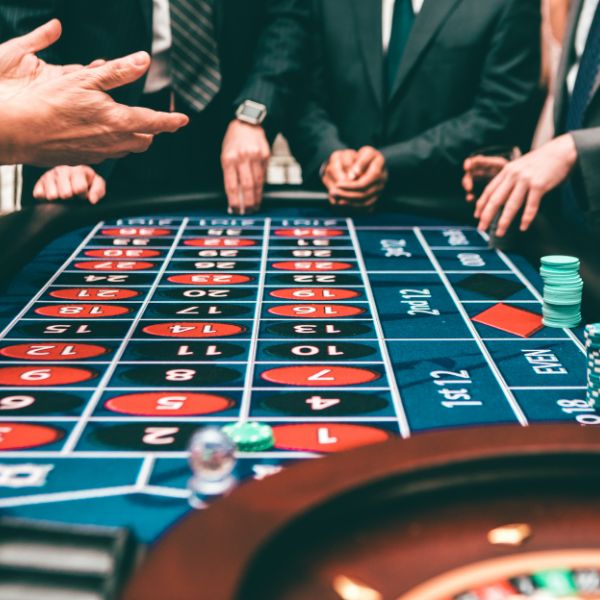The Comprehensive Guide to Responsible Gambling

In the casino field, it’s crucial to understand gambling addiction and its impact on individuals. Similar to other addictions such as drug addiction, gambling addiction is a mental health condition characterized by uncontrollable behavior patterns despite their harmful consequences.
Individuals with gambling addiction struggle to control their urge to gamble, even when they are aware of the negative consequences that come with it. This condition can lead to severe financial difficulties, strained social relationships, and other detrimental effects.
While there are various symptoms signaling the development of addiction, identifying it can be challenging without clear communication from the individual or an assessment of side effects, such as financial or occupational problems.
Understanding the potential causes of gambling addiction is crucial to address and prevent it. In Part 2 of this guide, we will discuss the contributing factors and how to recognize and treat gambling addiction.
Factors Contributing to Gambling Addiction
The causes of gambling addiction are complex and can vary from person to person. No one should be blamed for developing a gambling addiction, whether they were trying to win money to alleviate financial issues or already financially secure.
However, there are three primary categories of factors that can heavily contribute to the development of a gambling addiction. These categories include psychological factors, environmental factors, and biological factors.
Biological Causes
One of the main categories of causes of gambling addiction is biological predisposition. Each person’s brain is triggered by different factors, and some individuals may be more susceptible to addictive behaviors due to their brain chemistry.
Compulsive gamblers’ brains react to casino games as if they have consumed a chemical drug. This releases hormones of happiness, excitement, and even euphoria. Addiction to gambling is not a result of literally consuming anything, but rather to the chemicals released by the brain during gambling.
Some scientists suggest that predisposition to compulsive gambling can be genetically inherited, indicating that brain chemistry can be triggered in a predictable way. Biological causes of gambling addiction may be the most potent.
Psychological Causes
While biological causes of gambling addiction have a direct effect, psychological causes have an indirect impact that can be difficult to track. Distorted thinking and belief in gambling myths are common psychological causes that can contribute to the development of addiction. For instance, if a punter believes that they can earn a monthly income by playing slots, they may continue playing even if statistical data shows that their plan is impossible.
Another psychological factor is denial. Punters may be overconfident, minimize their losses, and boast about their wins, which prevents them from admitting they have a problem and seeking help. Distorted patterns of thinking prevent compulsive gamblers from recognizing their losses and accepting that their gambling presumptions may be wrong. Their desire to win back lost money is often stronger than their self-preservation instinct, which tells them to stop and take a break.
Social Causes
Social factors can indirectly contribute to the development of problem gambling. A lack of social support, issues at work or at home, and the desire to escape from reality can drive some individuals towards gambling addiction. For these individuals, real money betting can serve as an escape and a way to prove their worth if they happen to win big.
Another social cause is peer pressure. If a person’s social circle is actively involved in gambling, they may feel pressured to participate as well. This can be especially problematic if the person already has other risk factors for developing a gambling addiction, such as a biological predisposition. In addition, social circles of gamblers often promote myths and false beliefs about gambling, which can further influence an individual’s belief system and psychology.
Ultimately, social causes of gambling addiction can be difficult to overcome, as they often involve multiple factors that interact with each other in complex ways.
Recognizing You Have a Problem
Recognizing that one has a gambling problem can be a difficult task. Acknowledging that there is a problem is harder than quitting gambling itself. Addiction is less about control and more about the biology and psychology of the person, which can be complex and varied.
The reluctance to admit the problem can also come from the belief that gambling is the only source of joy in life. Sometimes, gamblers may be aware that they have a problem but rationalize it and continue their behavior.
However, there are potential symptoms that can help people recognize if they have a gambling addiction. These symptoms include gambling more than intended, feeling restless or irritable when not gambling, lying about gambling, chasing losses, and jeopardizing relationships or career due to gambling. Identifying these symptoms and acknowledging that they exist is the first step to seeking help and overcoming gambling addiction.
Problem Gambling – Symptoms
Problem gambling refers to the behavior of a person who is unable to control their gambling activities despite negative consequences. Some common symptoms of problem gambling include:
Compulsive Gambling: What are the benchmarks?
There are three stages of addiction when it comes to problem gambling: binge punter, problem punter, and compulsive punter.
The combination of behaviors exhibited by a person can help determine which stage of addiction they have reached. However, uncontrolled gambling at any level of severity can have serious long-term consequences on a person’s life.
The Negative Effects of Problem Gambling
Compulsive gambling can result in various negative effects that can impact different aspects of a person’s life. The following are some of the most common problems associated with problem gambling:
To avoid these negative effects, it is essential to learn responsible gambling practices and gamble safely.
How to Avoid Compulsive Gambling
If you’re looking to avoid compulsive gambling and play it safe, there are several things you can do.
It’s important to gamble responsibly and to be aware of the risks of compulsive gambling. By following these tips, you can enjoy the entertainment of gambling while minimizing the risks of addiction and other negative effects.
Protecting Minors from the Dangers of Gambling
Protecting minors from the dangers of gambling is crucial. Here are some ways to protect them:
While these measures may seem strict, it’s important to remember that they are in place to protect your child from potential harm. The approach you take as a parent is crucial in ensuring that your child understands the reasoning behind these measures and doesn’t feel their personal space is being violated. Ultimately, these steps can help prevent serious issues for your child in the long run.
Casino Operators and their Responsibilities
In general, it is not solely the responsibility of the casino operator if someone becomes addicted to gambling. While casinos and other forms of gambling have been around for a long time, not everyone who gambles develops an addiction. Additionally, online casinos are businesses and are designed to make money, so operators may try to entice potential and loyal customers to gamble more.
However, it is standard practice for reputable gambling platforms to provide means for preventing addictive gambling behavior. Some of these measures may include:
When choosing an online casino, it’s essential to pay attention to these features and options. If you’re unsure or lack information, contact customer support for more details. Even if you’re not a compulsive gambler, checking these aspects is a good way to ensure the reliability and trustworthiness of the site and operator.
How to Practice Responsible Gambling
To practice responsible gambling at a casino, you should utilize the tools and resources provided by the platform to set limits on your gambling behavior. These may include unsubscribing from marketing emails and avoiding promotions, setting deposit, bet, and loss limits, and requesting self-exclusion from the platform either temporarily or permanently.

It’s important to remember to only gamble with money you can afford to lose and to keep the activity fun and exciting instead of becoming consumed by it. If the platform doesn’t offer tools for financial management, you should create your own system for managing your spending by putting money on a separate bank account or e-wallet and stopping when that money is gone.
If you find yourself unable to stop gambling, you may need to use more drastic measures such as blocking your access to online casinos and betting platforms using parental control software. By practicing responsible gambling, you can enjoy the entertainment and excitement of gambling without developing an addiction or experiencing financial harm.
Problem Gambling: How to Get Help
If you think you have a problem with gambling, there are several steps you can take to get help.
Individual therapy and counseling can be more effective than group therapy since it helps to address underlying issues and problems that lead to gambling addiction. Additionally, medical treatment may be necessary if unhealthy and addictive behaviors are caused by depression, anxiety, or other brain chemistry imbalances.
Remember, seeking help is a sign of strength, and there is no shame in admitting you need assistance.
How to Help Someone
If you suspect that someone you love has a gambling addiction, there are a few things you can do to help them. Firstly, it’s important to recognize the signs of compulsive gambling behavior, such as lying about gambling habits, financial issues, and prioritizing gambling over relationships or responsibilities.
However, when approaching the individual, it’s crucial to avoid being judgmental or accusatory. Instead, educate yourself on the problem and potential underlying causes. Try to reflect on circumstances that may have led to addiction, and approach the situation with empathy and understanding.
Family and friends intervention is a popular strategy, but it should be done in a non-judgmental and supportive way. Seek advice and counseling from an expert before organizing an intervention, and be aware that immediate reaction is unlikely. The first step is to make the person aware of their behavior and offer support, but avoid pushing them to take action.
Ideally, the person should ask for further assistance and support on their own, but if not, offer options for therapy groups and therapists. It’s important to let the individual assess their options and take responsibility for their own recovery. Providing financial or other forms of assistance without effort on their part may only support their belief that their gambling habits have no negative consequences.
This Is A List Of Problem Gambling Organizations In Different Countries
Gambling is a popular activity across the globe, and as a result, millions of people engage in it. However, with the increasing popularity of online gambling, many individuals are at risk of developing a gambling problem. To address this issue, international companies and brands operating in the industry have collaborated to establish independent organizations and services aimed at assisting and safeguarding players from the negative effects of gambling. These organizations offer support in identifying, addressing, and treating addiction problems. If you require assistance, do not hesitate to contact the organization operating in your country of residence. Below is a comprehensive list of organizations actively working in various parts of the world.
- – UK:
- – UK:
- – UK:
- – UK:
- – UK:
- – UK:
- – France:
- – Spain:
- – Ireland:
- – Sweden:
- – Europe:
- – Europe:
- – Austria
- – Belgium
- – Czech Republic
- – Croatia
- – Denmark
- – Finland
- – Estonia
- – Germany
- – Italy
- – Malta
- – Netherlands
- – Portugal
- – Singapore
- – India
- – Philippines
- – New Zealand
- – New Zealand
- – Australia
- – Australia
- – Australia
- – Australia
- – Australia
- – USA
- – USA
- – USA
- – USA
- – Canada
- – Canada
- – Canada
- – Canada
- – Mexico
- – Brazil
- – Brazil
- – Argentina
- – Bolivia
- – Antigua and Barbuda
- – Colombia
- – Chile
- – Chile
- – Puerto Rico
- – Peru
- – Uruguay

